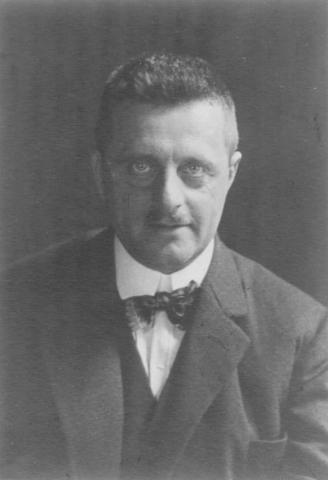August Loehr studied history and geography at the universities of Vienna and Heidelberg, obtaining his doctorate in 1905 with a work on Danube shipping until the end of the fourteenth century. That same year he became an ordinary member and librarian in the Institut für Österreichische Geschichtsforschung (Institute of Austrian Historical Research) and an ordinary member of the Österreichisches Institut (Austria Institute) in Rome. In 1906 he obtained a position as a researcher in the imperial coin collection in Vienna and became head of the collection in 1913. Apart from his work in the k. k. Kunsthistorisches Hofmuseum he was an expert in coin finds in monument preservation and studied in the Faculty of Law in Vienna, obtaining a doctorate in law in 1911. In 1929 he was awarded an honorary professorship in numismatics and the history of money at the University of Vienna. In summer 1938, as a "Mischling 2nd class" according to the Nazi definition he asked to retire as had been suggested to him by the authorities. He was no longer allowed to work as an honorary professor but was able to continue to carry out research and to publish and, from 1943, to use his office at the Kunsthistorisches Museum (KHM) again.
Immediately after the liberation of Vienna, he was appointed First Director of the KHM on 16 April 1945. In 1946 he founded the Museum österreichischer Kultur (Museum of Austrian Culture) as a department of the KHM in the Neue Burg and also taught museology at the University of Vienna. As a victim of Nazi persecution, in 1945 Loehr was appointed chairman of the Special Commission to Examine the Political Past of Public Servants of the Kunsthistorisches Museum (Senate No. 7 at the Staatsamt für Volksaufklärung, Unterricht und Erziehung und für Kultusangelegenheiten (State Office for Popular Enlightenment, Schools, Education and Cultural Affairs)) and vice-chairman of Senate No. 9 responsible for denazification in the Albertina, Österreichische Galerie, Museum für Volkskunde (Museum of Folk Life and Folk Art) and Museum für Völkerkunde (Museum of Ethnology). Under the Prohibition Act of 8 May 1945, 118 of the 343 employees of the museum – seven women and 111 men – were required to register on account of the Nazi past. In many cases the Special Commission recommended their continued employment because they had not been politically involved and their work was required for reconstruction. As First Director, Loehr was also responsible for the designation of objects subject to registration under the Vermögensentziehungsanmeldeverordnung (Asset Expropriation Registration Regulation). Although he gave a written assurance to the Ministry of Education that the KHM would register all objects subject to restitution and return them as quickly as possible, many objects were not registered, including the assets of the Teutonic Order or a fortepiano belonging to Frida Gerngross and her daughter Maria Gerngross, both of whom were murdered during the Shoah. He also suggested that in some cases the former owners now living abroad should "donate" some of their collections to the museum in return for export authorization from the Federal Monuments Authority for their remaining artworks. In 1949 he was appointed director general of the kulturhistorische Sammlungen des Bundes (Federal Cultural History Collections) before retiring at the end of that year, although he continued to lecture in numismatics and the history of money at the University of Vienna until 1954.

